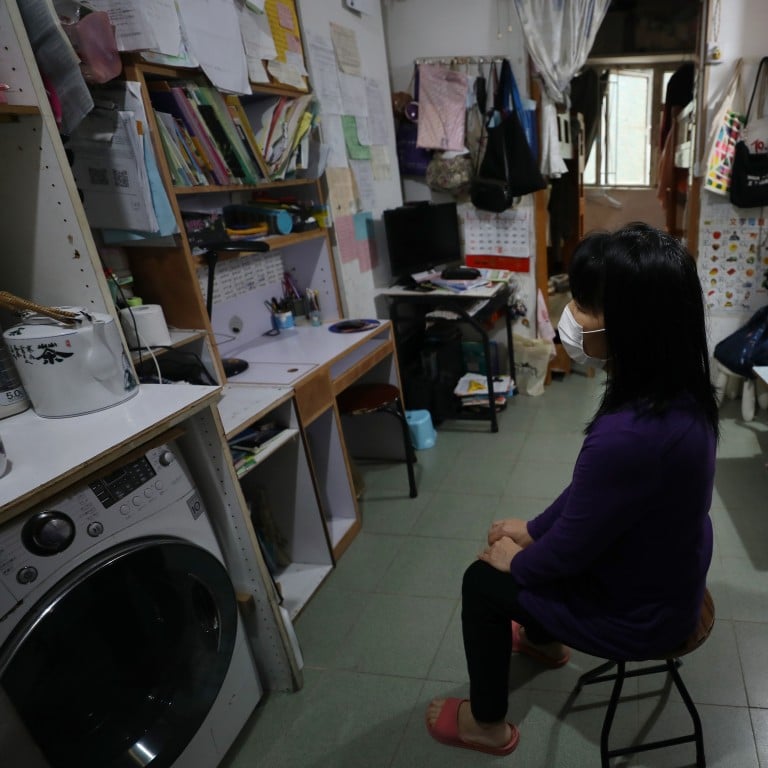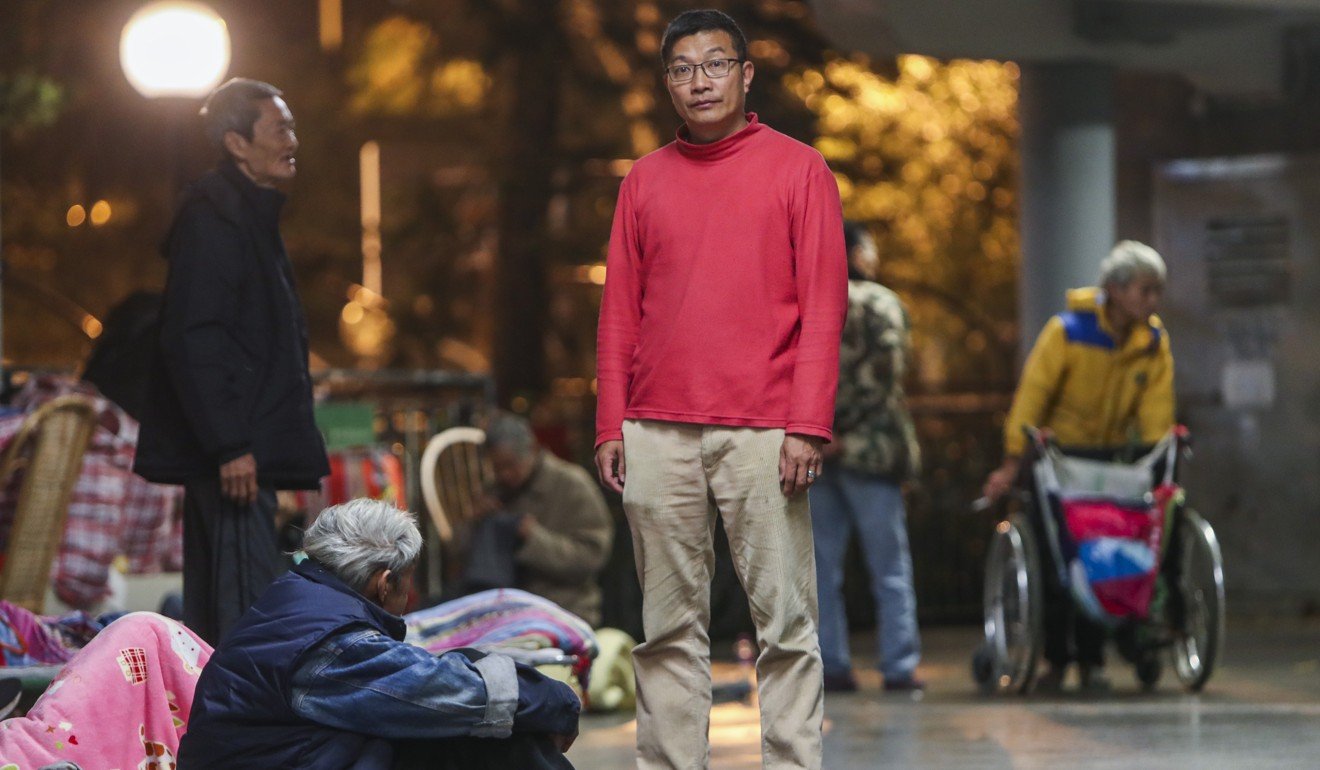
Coronavirus crisis exposes harsh existence of Hong Kong’s poorest households
- Quarantine centre offers respite for man living in a ‘stacked-up cage’, families cramped in tiny subdivided flats unable to afford masks, sanitiser
- Experts warn of ticking time bomb for children’s mental health as parents keep children indoors fearing contagion
Twice a week Mrs Lu leaves her seven-year-old twins home alone to buy food at the market in Tsuen Wan. She knows this is a criminal offence.
Speaking to the Post inside her 120 sq ft flat, with her boys playing with Lego on a bunk bed, she says: “It is crowded in the market. I don’t want to risk them getting infected. This is the only way I can buy food.”
Mrs Lu – who lives on the fourth floor of a walk-up in Tsuen Wan, a town in Hong Kong’s New Territories – realises she is putting her children at risk.
Ill-treatment or neglect of a child is an offence carrying a maximum penalty of 10 years in jail.
Mrs Lu, who is from Fujian province in mainland China and has lived in Hong Kong for six years, is one of around 210,000 people living in one of the city’s thousands of subdivided flats. She pays HK$6,500 (US$836) a month in rent.
Some of the flats are so small they are called cages and coffins.
Avoid crowds for tomb sweeping, officials urge as no new virus cases recorded
Doctors say the crowded and poor living conditions mean they are at high risk of contracting the coronavirus, which causes the Covid-19 disease and has plagued more than 130,000 people, killing nearly 5,000 globally.
In Hong Kong, 131 people have been infected, four of those fatally, as of Friday.
The health crisis, which has intensified into a pandemic since its emergence in the central Chinese city of Wuhan at the end of last year, has hit daily life in Hong Kong hard.

Wreaking havoc on the economy, it has brought much of the city to a standstill, triggered panic buying and isolated many through social distancing.
The public has struggled with shortages of surgical masks and sanitising products, with low-income households especially vulnerable.
Some of those say the lack of these basic supplies has led them to keep their children inside for long periods of time.
“It’s pretty common [to stop children going outside], especially for the subdivided units, because primarily they do not have masks and they do not want the kids to go out and get infected,” says Josephine Leung, executive director of The Hub, a community centre supporting low-income families in Sham Shui Po, the city’s poorest district.
Hong Kong’s poor struggling to buy essentials during coronavirus epidemic
Leung says she knows of around 80 families living in subdivided units, adding: “They have nothing. They do not have hand sanitiser and there are no classes, so they do not let the kids out, which is very sad.”
In 2018, researchers from the University of Hong Kong found some buildings housed up to six times the number of people they were designed for, and that such premises were at higher risk of outbreaks of fire and infectious diseases.
People who live in subdivided units need proper ventilation and for surfaces to be cleaned regularly, according to medical professionals.
“In the presence of poor ventilation the concentration of the virus will be a lot higher, so more people can be infected,” says Chinese University respiratory medicine expert Professor David Hui Shu-cheong.
However, he points out that there have been no infections in the city related to subdivided units, so far.

The Education Bureau last month ordered an extension to the closure of kindergartens, and primary and secondary schools until at least April 20 to minimise the chances of contagion.
But experts warn that staying in confined conditions for a long period of time creates mental health risks.
Brent Horner, a clinical psychologist at the London Medical Clinic in Hong Kong, cites a study on children from February 26, published in the journal Frontiers in Psychology, which found children who go outdoors and are “connected to nature” are happier.
“In layman’s terms it would be cabin fever,” says Dr Horner. “Something kids really crave is having a sense of stability and security, a routine. So that has been totally disrupted and that is not good for their mental health.”
Coronavirus threatens to undermine China’s anti-poverty drive
Mrs Lai, who also wants to remain anonymous, shares an 800 sq ft subdivided flat with nine other households in Sham Shui Po. She says her two children have gone outside only twice since the end of January.
Lai is concerned that living in proximity to other people will increase her family’s risk of infection so she does not want her children, a seven-year-old son and nine-year-old daughter, to walk past the other units when leaving the flat.
“I know they feel bored and angry,” the 52-year-old says. “We do not have a TV, so they spend a long time reading. My son keeps asking when he can go back to school and see his classmates.”
Mrs Lin, not her real name, shares the same concern. Her seven-year-old and five-year-old daughters rarely leave their 110 sq ft flat in Tsuen Wan.
The space does not have a bed. Instead, the family of four sleep on mats on the floor, and share a fold-up table where the children do their homework.
“I feel like my older daughter has changed a lot,” the 40-year-old says. “For example, when my daughters are playing together, she would yell and scream … she is very agitated.”
Amid uncertainty over how long the pandemic will last and when exactly schools will reopen, Dr Horner warned of the possible toll on children’s mental health.
“Uncertainty most often leads to anxiety, but it could potentially lead to depression as well,” he says.
Guo Yongfeng shares a 485 sq ft flat with 17 other residents. His living space is just big enough for him to lie down, with his belongings in bags hanging above him on hooks.
Each cubicle where they are housed has a sliding door, and people are stacked on top of each other in spaces resembling cupboards. The entire flat has one window.
“I feel unsafe as we are 18 people living together,” says the 66-year-old, who pays HK$2,000 a month in rent. “They have different jobs. They go out every day and you do not know who they’ve been with.”
Guo visited his hometown of Harbin in Heilongjiang province during Lunar New Year. On his return to Hong Kong, his housemates discovered he had been to the mainland.
“My housemates got very angry. I can understand why,” he added.
He was quarantined in February in Sai Kung, where he shared a room with six people and was given three meals a day by the government.
“[Each person] had a single bed there. It’s in quite good condition, better than where I live now. My place is just stacked-up cages, but [at the quarantine centre] at least we got a room.”
Coronavirus-battered NGO sector says government aid now a must
For Neon Yiu Ching-hei, a member of land concern group Liber Research Community, the outbreak of Covid-19 has highlighted how building conditions affect the poorest households in the city, who are living and quarantining themselves in subdivided units.
“The government thinks that increasing the housing supply will solve the subdivided flat issue, but the supply-oriented direction of the government has led to the deterioration of housing conditions in Hong Kong and that particularly strikes poor households in Hong Kong,” Yiu says.
“I think now is a time to rethink Hong Kong’s housing policy to focus more on improving the housing conditions of the existing stock.”
Government officials have conceded they may fall short in meeting the 10-year target of creating 280,000 public and subsidised housing units by 2027/28. The average waiting time for public housing applicants was 5½ years in 2018/2019.
A record 1.38 million residents were below the poverty line in 2018 on incomes as low as HK$4,000 a month, according to government data.
For some, sleeping outside is preferable to their homes during the Covid-19 outbreak. In an underpass beneath the Hong Kong Cultural Centre, dozens of people sleep on cardboard boxes.
Sharing the wealth: Hongkongers take matters into own hands over mask shortage
Among them is Peter, who works part-time as a street cleaner. He pays rent on a flat in Tin Shui Wai, near the border with mainland China, but told the Post he chooses to sleep outdoors.
“I’m afraid as the coronavirus spreads, it might jump from one housing block to another. It’s safer here,” the 66-year-old says. “Even in the tunnel, there is wind coming from above. There is air ventilation.”
Handing out masks to the homeless is Society for Community Organisation organiser Ng Wai-tung. There are 1,127 people sleeping rough, according to official figures.
However, Ng believes the number could be around 2,000 and climbing as more people have lost their jobs over the past two months.
“They face expensive rents that they cannot afford, in cubicles with no windows or air conditioning,” says Ng. “Some believe living in a cubicle is worse than being homeless. This is a very sad situation.”

